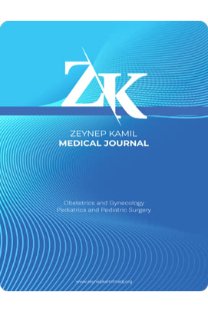Erken Başlangıçlı Maternal Rh İzoimmunizasyonu Nedenli Fetal Hidrops Olgusunun Başarılı Yönetimi; Olgu Sunumu
Successful Management of Hydrops Fetalis Due to Maternal rh Alloimmunization at early Second trimester: case report
___
- 1. Howe, DT, Michailidis, GD. Intraperitoneal transfusion in severe, early-onset Rh isoimmunization. Obstet Gynecol 2007; 110:880.
- 2. Cid, J, Lozano, M, Fernandez-Aviles, F, et al. Anti-D alloimmunization after D-mismatched allogeneic hematopoietic stem cell transplantation in patients with hematologic diseases. Transfusion 2006; 46:169.
- 3. Mari, G, Deter, RL, Carpenter, RL, et al. Noninvasive diagnosis by Doppler ultrasonography of fetal anemia due to maternal red-cell alloimmunization. Collaborative Group for Doppler Assessment of the Blood Velocity in Anemic Fetuses. N Engl J Med 2000; 342:9.
- 4. Pretlove, SJ, Fox, CE, Khan, KS, Kilby, MD. Noninvasive methods of detecting fetal anaemia: a systematic review and meta-analysis. BJOG 2009; 116:1558.
- 5. Zimmerman, R, Carpenter, RJ, Jr., Durig, P, Mari, G. Longitudinal measurement of peak systolic velocity in the fetal middle cerebral artery for monitoring pregnancies complicated by red cell alloimmunisation: a prospective multicentre trial with intention-to-treat. BJOG 2002; 109:7
- 6. Fox, C, Martin, W, Somerset, DA, et al. Early intraperitoneal transfusion and adjuvant maternal immunoglobulin therapy in the treatment of severe red cell alloimmunization prior to fetal intravascular transfusion. Fetal Diagn Ther 2008; 23:159.
- 7. Harman, CR, Bowman, JM, Manning, FA, Menticoglou, SM. Intrauterine transfusion--intraperitoneal versus intravascular approach: a casecontrol comparison. Am J Obstet Gynecol 1990; 162:1053.
- 8. Van Kamp, IL, Klumper, FJ, Oepkes, D, et al. Complications of intrauterine intravascular transfusion for fetal anemia due to maternal red-cell alloimmunization. Am J Obstet Gynecol 2005; 192:171.
- 9. Schumacher, B, Moise, KJ, Jr. Fetal transfusion for red blood cell alloimmunization in pregnancy. Obstet Gynecol 1996; 88:137.
- 10. Moise, KJ, Jr., Carpenter, RJ, Jr., Kirshon, B, et al. Comparison of four types of intrauterine transfusion: effect on fetal hematocrit. Fetal Ther 1989; 4:126.
- 11. von Kaisenberg, CS, Grebe, S, Schleider, S, et al. Successful intrauterine intracardiac transfusion in monochorionic twins affected by parvovirus B19. Fetal Diagn Ther 2007; 22:420.
- 12. Yinon, Y, Visser, J, Kelly, EN, et al. Early in trauterine transfusion in severe red blood cell alloimmunization. Ultrasound Obstet Gynecol; 36:601.
- 13. Moise, KJ, Jr., Mari, G, Fisher, DJ, et al. Acute fetal hemodynamic alterations after intrauterine transfusion for treatment of severe red blood cell alloimmunization. Am J Obstet Gynecol 1990; 163:776.
- 14. Radunovic, N, Lockwood, CJ, Alvarez, M, et al. The severely anemic and hydropic isoimmune fetus: changes in fetal hematocrit associated with intrauterine death. Obstet Gynecol 1992; 79:390.
- ISSN: 1300-7971
- Yayın Aralığı: 4
- Başlangıç: 1969
- Yayıncı: Ali Cangül
Postmenopozal Servikal Stenoza Sekonder Gelişen, Pelvik Kitleyi Taklit Eden Hematometra ve Yönetimi
Hüseyin PEHLİVAN, Aşkın Evren GÜLER, Uğur KESKİN, Hakan ÇOKSÜER, Erhan AKTÜRK, Ali ERGÜN
Primer Konjenital Glokomda Trabekülotomi ile Kombine Mitomisinli Trabekülektomi Sonuçlarımız
Serhat İMAMOĞLU, Mehmet Şahin SEVİM, GÖKHAN PEKEL, Hüseyin Avni SANİSOĞLU
Fetal Over Kistlerinde Tanı, İzlem ve Tedavi; Olgu Sunumu
Aşkın Evren GÜLER, Cihangir Mutlu ERCAN, Emre KARAŞAHİN, Ali ERGÜN, Uğur KESKİN
Makrozomik Gebeliklerin Doğum Şekilleri ve Sonuçları
Mehmet GÜL, OYA DEMİRCİ, Oya PEKİN, Hamdullah SÖZEN, Doğan VATANSEVER, ARİF AKTUĞ ERTEKİN
Turhan ARAN, Mehmet A. OSMANAĞAOĞLU, İpek PEKGÖZ, Hasan BOZKAYA
Gestasyonel Trofoblastik Hastalıklar ve Takip Oranları
Özgür Aydın TOSUN, Pınar BATU, l Arzu ARINKAN³, Ertuğrul YILMAZ, Çetin ÇAM, Ateş KARATEKE
Preeklampside Genetik Trombofilik Belirteçler
MEHMET AKİF SARGIN, Emel ASAR-CANAZ, Ali GEDİKBAŞI, Hilmi TOZKIR, Yavuz CEYLAN
Hidrops Fetalisli Yenidoğanda Bilateral Akut Skrotum için Eksplorasyon Kararı Ne Kadar Yaşamsal?
GÖKMEN KURT, Ayşenur CERRAH CELAYİR, Koray PELİN, Oktay BOSNAL, Serdar MORALIOĞLU
